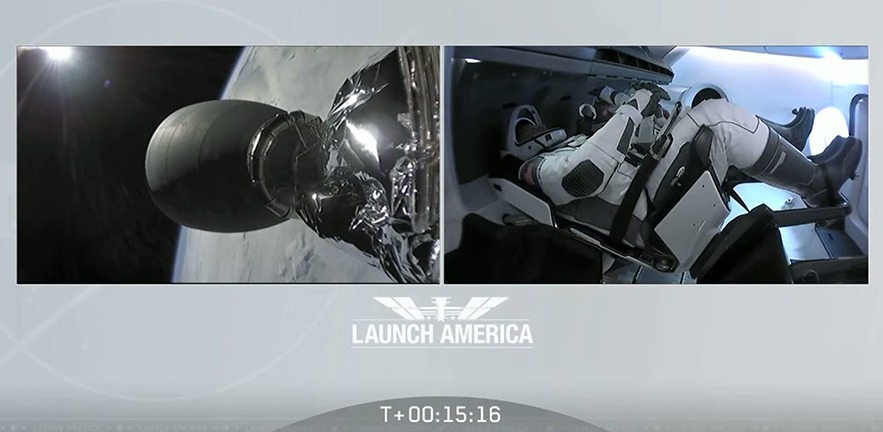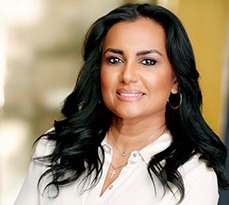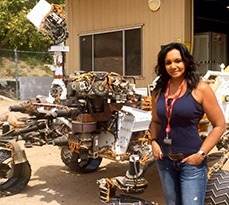With the launch of SpaceX Dragon capsule in June and the planned launch of NASA’s Mars Rover in July, space exploration has never been more topical. As the world is slowly coming out of pandemic restrictions, could space be the ultimate distance we need for recovery?

Cambridge MBA student Melony N.M. Mahaarachchi shares her insights after nearly a decade designing a future.
Early career and a startup journey

Melony Mahaarachchi (MBA 2019) is a prolific mechanical, robotics, and rocket engineer. She came to the United States with her family from Sri Lanka and built her career completely from scratch after graduating from UCLA with a degree in mechanical engineering.
“I started at SpaceX a few months after graduating, it was during the global financial crisis at that time.
“I started a job I was not even qualified for; I was lucky enough to have my CV in their hands and while they were looking for an electrical engineer and I was a mechanical engineer, I was willing to learn and be creative – I knew I could adapt.”
Melony was fortunate to begin her career working alongside the founder and US billionaire Elon Musk. She says, “I was able to learn a lot from Elon Musk as the founder of SpaceX. I have always got dragged into new projects and designs, where sometimes Elon would sit with our team and he would give his input, like a working teammate, rather than a founder.
“During SpaceX’s recent historical Crew Dragon launch I was immensely proud to see that my engine subsystem designs and second stage cameras, I placed before leaving the company, are still in use. Seeing the MVAC engine burn side by side with NASA astronauts Doug Hurley and Bob Behnken comfortably riding the Dragon was uncanny.”
But as her family grew, Melony needed a position that allowed her to balance the needs of the family as well as her career. “The pace at SpaceX was very frenetic, when I left, I had a sleeping bag and a toothbrush under my desk!”
Career switch to Boeing
Boeing is a very well-established company, so she went from a startup to a 103-year-old company.
“Although I loved designing aircraft, it was not as fun as designing rockets,” she says.
“I missed the pace and organisational culture of the startup. At Boeing I was given three weeks to do designs that would take me three days before.”
She continues, “I now advise those starting out on their careers to be careful about choosing their first job or next move.
“You need to think about company culture and question yourself, is this the culture you want to start with, as it does shape your future career and attitude?”
NASA and Mars Rover

“When NASA contacted me, I was more careful, I did my due diligence and I made sure that the company culture would be a good fit with my personality and skills.
“The Mars Rover programme interested me as the budget had been secured, the milestones planned out and it was a very very ambitious programme – I knew it was going to be fast paced again.
“NASA was a mix between a startup and a traditional company, so it was a good balance for me.”
Melony negotiated carefully during the interview process; “As a woman, especially women engineers, we don’t negotiate enough for what we want.”
Melony was appointed as the Lead Engineer of Mars Rover 2020 mission at NASA Jet Propulsion Laboratory (JPL). “NASA’s Mars programme has never attempted to design a fully digital mockup of any electrical subsystem before because of its complexity. I was leading the internal cabling design and communication system with a team of six, to help them achieve this feat.”
Melony explains; “The growth opportunity at NASA was immense, my personal development as an engineer and as a professional was enormous. Most of the time I felt like I was the least knowledgeable person in the room. The intellectual environment was very nurturing.
“My personality completely changed at NASA. The humbleness of those around me was inspiring.
“I cannot put a value on the experience that I got from the people I worked with at NASA.
“When the Mars Rover launches, I will be immensely proud. The mission is the thing that always excites me.”
Just before launch the Rover is always named, this one is now called ‘Perseverance’.
“Which is perfectly appropriate to the world we are living in right now,” Melony says.
Developing a not-for-profit on the side
Not content with a busy career at NASA, Melony also developed a not-for-profit enterprise, iSTEM Without Borders, supporting and empowering young women into STEM.
She explains, “I had alternate Fridays off at NASA. I would load up my car with robots and engineering models and visit schools in Los Angeles, many in the poorer neighbourhoods.
“By this time, I was looking at the world from the perspective of a mother and I wanted the same equality of opportunity and potential for everyone, as if they were my own children. Sometimes it takes only one story to inspire someone.”
Being the face of her own not-for-profit was Melony’s way of showing any woman can contribute in numerous ways to STEM and be great at it.
“When someone tells me I cannot do something, I want to try and push myself even more. I draw my energy from being the first to do something. There is a lot of fun and satisfaction in breaking barriers. It allows so many new opportunities for others who follow.
“People told me you cannot get into the aerospace industry; it is too difficult, and you have your family commitments as well. And then look, I ended up at NASA.”
She says “Roadblocks are a part of your career journey. Just learn to face them and create your own path so it’s a little easier for the next generation.”
A new mission – the Cambridge MBA
“When I completed the Mars Rover programme I was at a major crossroad in my career. I was asking myself – do I continue the same path in the aerospace industry, or do I go and learn a new set of skills? How do I add value to myself, so I am more impactful?”
At this point Melony received an acknowledgment of her success from Melinda Gates. “This public acknowledgement on social media, brought an overwhelming response from across the world and opened many opportunities for me.”
Melony was invited to Sweden for a research visit to see companies like Ericsson, R.I.S.E, Electrolux and Munters AB. She met some of the leaders who were tirelessly changing the workplace to be more inclusive. “That short trip completely changed my perception of my career moving forward, and particularly my view of women in the workplace.
“I realised my effort to bring change in organisations was limited as an engineer. I needed to position myself as a leader to make an impact. We can be part of the change, right?”
Doing an MBA was part of the new mission she had. Melony wanted to understand and make change in organisations from the inside.
“Once you have designed something like Mars Rover, you have set yourself so high on the bar that you cannot go and do something much simpler. That’s when I decided that I wanted to come to business school.
“So, the whole of my career progress has led me towards coming to do my Cambridge MBA.
“In my nine years of engineering experience, I envied the business divisions I had dealt with. It was frustrating how the business division had the last say even during a technological breakthrough.
“I looked back and thought ‘how do you balance the innovation alongside the business side of any organisation?’”
Melony thought, “What if I go and get my business degree and then go to the other side of the table? Then I can make business decisions understanding the engineering.”
Melony began looking for an MBA programme that would challenge traditional ways of thinking. For an example, making critical decisions in the absence of data is extremely rare in engineering. She was looking for a programme that would also give her practical experience during her transition as a business leader.
“The rigorous Cambridge MBA curriculum stood out the most. I was also looking for a diverse cohort. If I ever want to focus on cross-border business, I would rather be in a programme that offers the kind of international blend I’m looking for. What better way to immerse in a learning experience that offers global experience with a cohort of 98 per cent international students?
“Every class I have taken on my Cambridge MBA has sharpened my will to learn more.”
Equipped for the future
“I now have a lot more faith in myself and more confidence that I will be equipped to help companies make changes within organisational cultures and systems.
“I have learned how to navigate ambiguity and understand a problem at a higher level, and how to apply solutions in a systematic way even in the absence of data.
“During the first term, for example, we were stretched further than I have ever experienced. My boundaries were stretched enormously.
“But this was okay as when we return to the job market and hold positions of authority, we need to have been stress tested right?”
The Cambridge MBA programme, especially with practical projects like the Cambridge Venture Project (CVP) and the Global Consulting Project (GCP), encourages students to take risks and learn.
“For our team GCP, we were supposed to be onsite in the beautiful city of Kastela, Croatia. Due to COVID-19 we quickly had to adapt and work remotely in four different time zones to successfully deliver the same quality and output required.
“Our unexpected and unique GCP experience has strengthened our abilities, entering the current job market.
“I found the programme overall fosters innovation and academic risk, and it helps us see where this might take us.
“We are taught to be different, to think across boundaries and sectors and to be agile.”
A new horizon
“As we are now graduating in the climate of this pandemic, the Cambridge MBA skills will be even more in demand. The MBA has taught us to think out of the box and to solve problems with creativity and resilience.”
Having graduated from engineering during the 2008-09 financial crisis and now in the COVID-19 climate of 2020, Melony looks at the worst-case scenario as an opportunity and she continues to look for the positives in any situation.
“My Cambridge MBA year has given me an enriched version of myself.
“Although the engineer in me will never die, I am very excited to see how my future career path will reshape with the new skills and experiences, as well as the new lifelong friendships I have developed across my time at Cambridge.”
Lastly, she says “My long-term ambition is to go back to Sri Lanka and help turn businesses around. To help foster a culture that celebrates women who can balance a career and family – the very reason that prompted me to leave the country 17 years ago.”
On her space career to date Melony concludes, “Some of my designs are already in space, but when my new designs reach Mars, I will have to pinch myself.”

